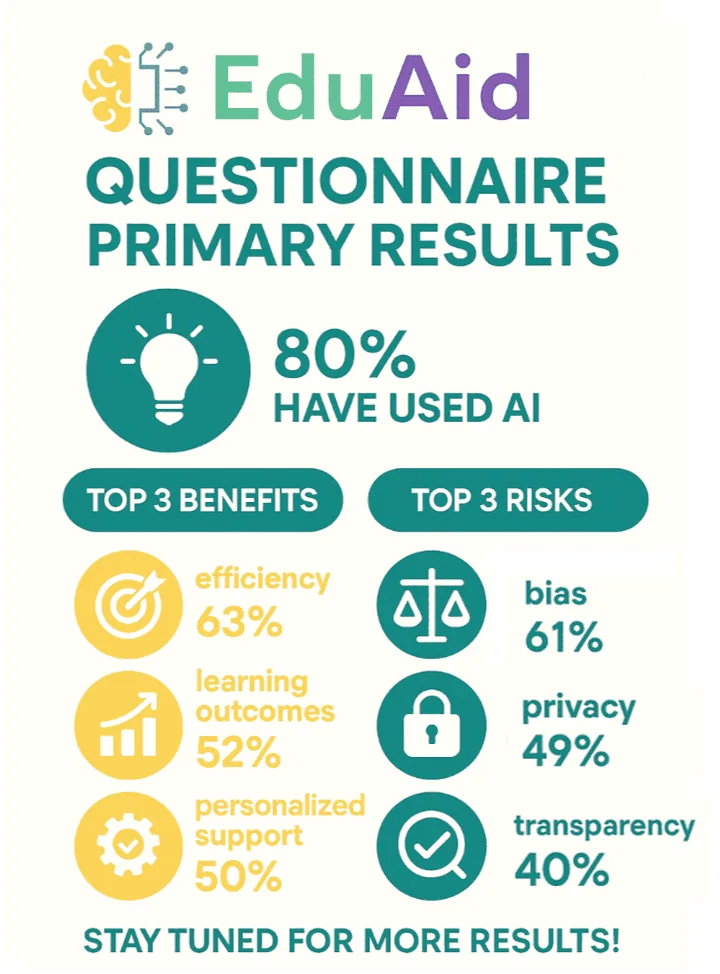AI in Education: What European teachers and decision-makers are telling us
Author | Salma Sassi & Richard Chbeir
Université de Pau et des Pays de l’Adour

Artificial Intelligence is increasingly present in our professional lives sometimes without us even realizing it. It powers our search engines, shapes our digital communication tools, and increasingly permeates educational platforms. Yet in the education sector, this growing presence raises as many hopes as it does concerns. In this context, the European project “EduAId-Transforming Education with AI-Microcredentials” launched a European-wide survey to better understand how education professionals perceive and use AI, and what they expect from it. This activity is part of its Work Package 2 (WP2), which we lead on behalf of the Université de Pau et des Pays de l’Adour (UPPA), in close collaboration with ESHA.
A diverse and committed group of respondents
The survey collected responses from over ten European countries. Participants included primary and secondary school teachers, university educators, school leaders, policymakers, education researchers, and institutional representatives. This broad panel ensures a diversity of perspectives grounded in day-to-day classroom realities, as well as in policy and institutional leadership.
Key insights: between enthusiasm and caution
The results show strong curiosity and engagement: more than 80% of respondents have already experimented with AI tools in their educational practice.
Their motivations? Saving time on administrative tasks, enriching pedagogical content, and better addressing diverse learner needs. Many also see AI as a way to make education more accessible and personalized. Yet this enthusiasm is tempered by thoughtful caution. Respondents raised major concerns, including algorithmic bias, data privacy risks, dependency on commercial platforms, and the risk of excessive standardization of learning experiences.
AI-powered micro-credentials: promising but still emerging
One section of the survey focused on AI-powered micro-credentials short, targeted certifications that can recognize specific competencies, sometimes through intelligent assessment. The concept is still unfamiliar to many (only 8% have used or developed them), but interest is growing. Respondents see potential in these flexible, personalized learning formats provided they are transparent, trustworthy, and aligned with recognized standards.
Ethics and training: the real priorities
Education professionals are not simply asking for more technology they’re asking for more support. The top priority cited was teacher training, followed by a strong need for clear ethical and regulatory frameworks.
Key suggestions included:
- embedding AI and digital ethics into teacher education and professional development,
- providing intuitive tools adapted to real classroom contexts,
- encouraging collaboration between educators, researchers, and developers,
- and creating AI regulations tailored to the education sector, grounded in its core values.
What’s your perspective on AI in education?
We warmly invite all education professionals; teachers, school leaders, trainers, researchers, and policymakers to share their experiences and perspectives on AI in education by filling the following online form. Your insights will play a vital role in shaping the next generation of AI-powered micro-credentials, ethical frameworks, and training resources tailored to the needs of educators across Europe.
Exploring AI integration in education
eshalink.eu/form-2025-07
What’s next?
In the coming months, the EduAId team will be hosting a series of interactive online sessions to delve deeper into the survey results, share emerging insights, and co-design tools with education stakeholders. If you would like to be informed and possibly take part in these online discussions, you can register your interest by filling out this short form:
Register to participate and/or stay informed
eshalink.eu/EduAId-Expression
All data will be handled in strict compliance with ethical and data protection standards, in line with the EduAId project’s commitment to GDPR and responsible research practices.